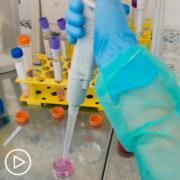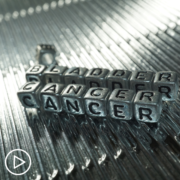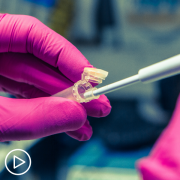Emerging Approaches in Bladder Cancer Treatment
Emerging Approaches in Bladder Cancer Treatment from Patient Empowerment Network on Vimeo.
Dr. Shilpa Gupta of the Cleveland Clinic shares a promising update in bladder cancer treatment and research, including the benefits of patient participation in clinical trials.
Dr. Shilpa Gupta is the Director of the Genitourinary Medical Oncology at Taussig Cancer Institute and Co-Leader of the Genitourinary Oncology Program at Cleveland Clinic. Dr. Gupta’s research interests are novel drug development and understanding biomarkers of response and resistance to therapies in bladder cancer. Learn more about Dr. Gupta, here.
See More From The Pro-Active Bladder Cancer Patient Toolkit
Related Programs:

The Importance of Patient Self-Advocacy in Bladder Cancer Treatment |

|

|
Transcript:
Katherine:
So, Dr. Gupta, are there emerging approaches for treating bladder cancer that patients should know about?
Dr. Gupta:
Yes, absolutely. I would say that the field is so rife with so many different treatment approaches and ways to offer more personalized medicine. We know, for example chemotherapy followed by surgery has been the gold standard, but we have seen data that there are certain genes in some patients’ tumors which may predict how well they will respond and potentially we could avoid a life-changing surgery like cystectomy.
And we have trials with immunotherapy adding to chemotherapy in bladder preservation approaches along with radiation. So, these are some of the new work that’s been done. Approaches to intensify the effect of BCG in newly diagnosed non-muscle invasive bladder cancer patients are also ongoing. Then, in the metastatic setting, we have so many treatment options that have become approved in the last couple of years, now the goal is, well, how to sequence the therapies best for the patient and whether in the front-line therapy we can actually get rid of chemotherapy.
Some of these antibody drug conjugates and immunotherapy combinations are proving to be very effective and the hope is that one day patients may not need chemotherapy because we have chemo-sparing regimens. So, there’s a lot going on and I think the progress has been tremendous in the past few years.
Katherine:
Some patients may be fearful when it comes to clinical trials. So, what would you say to someone who might be hesitant to consider participating in one?
Dr. Gupta:
I would say there’s a lot of misconceptions out there that going on a trial is like being a guinea pig or you get a placebo. For the most part, patients are getting active drugs whenever possible. The only time where we have placebo-controlled trials is if, for that particular setting, there is no approved treatment. But I think patients should get all the information from their doctors and the study teams about the pros and cons.
Many times, it’s about – you could do the study because the patients meet the criteria and are fit to do it and if they wait for later, they may not be eligible anymore for whatever reasons.
I always put it this way, that standard of care therapies will still be available, but studies are sometimes with a tight window and tight criteria. So, I think patients should know that all these studies that are out there are very ethical and use the best possible control arm. So that even if they don’t get that experimental drug, they still get what is the standard of care unless it is something really being compared to nothing.








